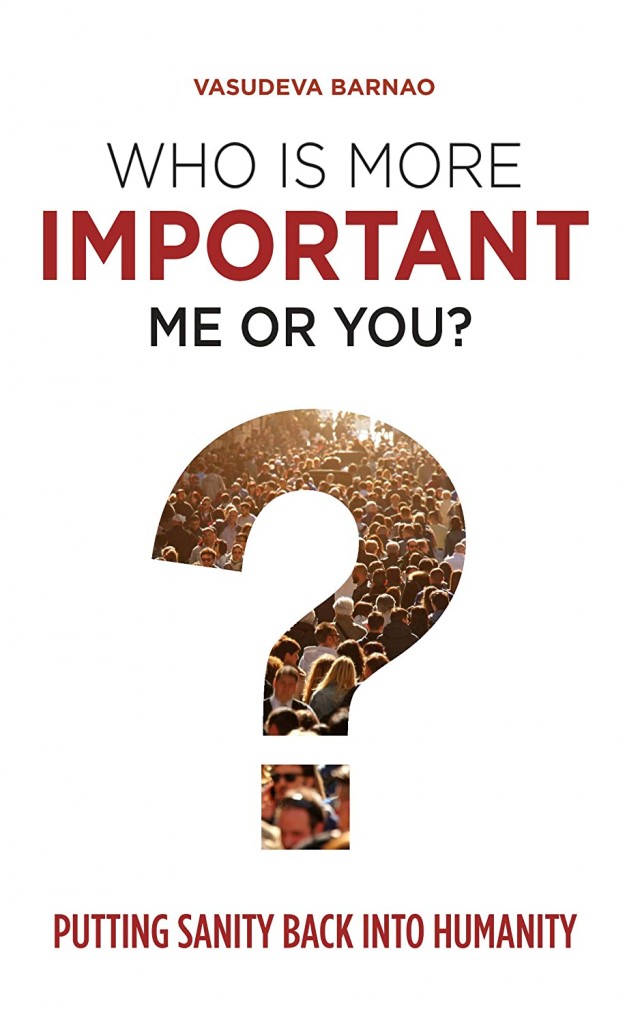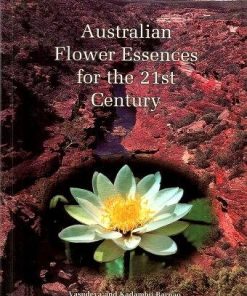Book – Who Is More Important Me or You?
$20.00
Unfortunately Amazon is being very slow with our bulk orders for this book. Please purchase it directly on Amazon by clicking this link.
Out of stock
This product will be back in stock very soon. Sign up here to receive an email notification as soon as it becomes available.
Who Is More Important Me or You?
Putting Sanity Back Into Humanity
Vasudeva Barnao
Psychology tells us that childhood trauma, including during adolescence, conditions how people respond to life and shapes how they feel and think.
In a broader context, we could say that humanity, in its formative years, was traumatised by their upbringing on planet earth. We have experienced the savagery of predators, have survived famines, storms, floods and earthquakes as well as the man-made wars as we squabbled over Mother Nature’s riches. We could say that Mother Nature has been neglectful in her care of us and that we as her children have been shaped by the trauma experienced as we fought her to survive. We have surely been shaped by the aeons of these situations we have encountered.
As with most children who grow up feeling unsupported in a stressed-filled, conflict ridden family environment, our minds have been shaped to focus on survival and on getting ahead in life even when it is at the expense of others.
While it is normal to have strong opinions and be focused on fulfilling our desires and goals, it becomes a problem within our personal relationships when this undermines the trust others have in us. This usually takes place when we become so opinionated and obsessed about fulfilling our goals and desires that we (knowingly or unknowingly) treat others in ways that we would not want to be treated. In other words, when we treat people unfairly. When we behave in this way, it not only makes it harder for others to trust us with their well-being, but it also tends to undermine their desire to support and care for us.
When the minds of people have been conditioned to see life from a given perspective, it shapes their unconscious and automatically frames how they view life and react to it. When we feel unsupported and grow up in a stress-filled, conflict-ridden environment, it is easy to feel that it is only losers who do not have strong opinions and prioritise the fulfilment of their goals and desires over others. A person whose unconscious mind has been conditioned to see life this way tends to suffer from tunnel vision and fails to make the connection between their unfair, abusive behaviour and the lack of support they receive from others. Failing to make this connection, they often feel unsupported and let down – which only compounds their belief in the need to be opinionated and prioritise the fulfilment of their goals and desires over others to get ahead in life.
How often have you seen this type of “Groundhog Day” scenario play out within the dynamic of child-parent relationships, love life relationships and those between friends? People often fail to make the connection between their unfair, abusive behaviour and their own unhappiness.
The book “Who Is More Important Me or You”, gives a practical, inspirational and thought-provoking understanding of how people can rework relationships so that they are beneficial and a source of happiness, without compromising their own well-being or having to treat others in ways they would not want to be treated. From end to end this book builds deep insights into the workings of human relationships on all levels, from families to societies. It also offers the pathways needed to break free of the unconscious mindset inherited from our parents, grandparents and great grandparents. Shaped by human history, this mindset tends to limit our options when handling everyday relationship difficulties and traps us in negative behavioural loops when interacting with those we love.
| Weight | 350 g |
|---|---|
| Dimensions | 21.5 × 14 × 2 cm |
Related products
Practitioner Tools & Books
Practitioner Tools & Books
Practitioner Tools & Books
Practitioner Tools & Books
Practitioner Tools & Books






